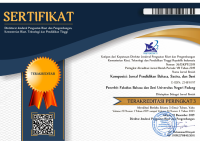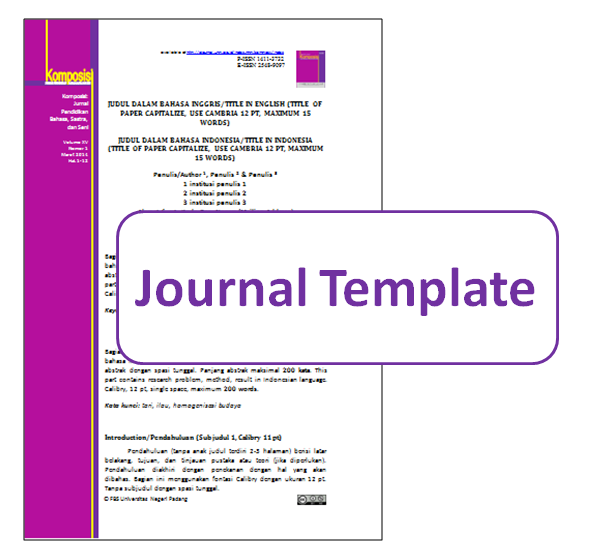Strategy to Improve Student’s Competence in Writing Opinion Article based on Enviromental Issues
 ), Nugraheni Eko Wardani(2), Chafit Ulya(3),
), Nugraheni Eko Wardani(2), Chafit Ulya(3), (1) Universitas Sebelas Maret
(2) Universitas Sebelas Maret
(3) Universitas Sebelas Maret
 Corresponding Author
Corresponding Author
Copyright (c) 2020 Komposisi: Jurnal Pendidikan Bahasa, Sastra, dan Seni
DOI : https://doi.org/10.24036/komposisi.v21i2.110424
Full Text:
 Language : id
Language : id
Abstract
Keywords
References
As-syakur, A. R., Suarna, I. W., Adnyana, I. W. S., Rusna, I. W., Laksmiwati, I. A. A., & Diara, I. W. (2008). Studi Perubahan Penggunaan Lahan di Das Badung. Jurnal Bumi Lestari, 10(2), 200–208.
Capra, F. (1997). The Web of Life: A New Scientific Understanding of Living Systems. In Flamingo. https://doi.org/10.2307/1521798
Chili, N. S. (2014). The Ecology of Teaching: Efficiency, Efficacy and Effectiveness of Teaching and Learning of Tourism in Township High Schools. Journal of Human Ecology, 48(2), 299–312. https://doi.org/10.1080/09709274.2014.11906799
Cunningsworth, A. (1995). Choosing Your Coursebook. Heinemen.
Elamin, M. Z., Ilmi, K. N., Tahrirah, T., Zarnuzi, Y. A., Suci, Y. C., Rahmawati, D. R., Dwi P., D. M., Kusumaardhani, R., Rohmawati, R. A., Bhagaskara, P. A., & Nafisa, I. F. (2018). Analisis Pengelolaan Sampah Pada Masyarakat Desa Disanah Kecamatan Sreseh Kabupaten Sampang. Jurnal Kesehatan Lingkungan, 10(4), 368–375.
Gasman, M. (2014). How to Write an Opinion Essay and Why You Should Do It Now. Phi Delta Kappan, 96(1), 28–29. https://doi.org/10.1177/0031721714547858
Kaliky, P. I. (2013). Pemanfaatan Internet dalam Pembelajaran Mahasiswa di Universitas Pattimura, Ambon. Jurnal Komunika KAREBA, 2(1), 110–120. https://doi.org/doi.org/10.31947/kjik.v2i1.354
Keraf, A. S. (2014). Filsafat Lingkungan Hidup: Alam sebagai Sebuah Sistem Kehidupan Bersama Fritjof Capra. Kanisius.
Kosasih, E. (2006). Cerdas Berbahasa Indonesia. Erlangga.
Mason, L. H., & Shriner, J. G. (2008). Self-regulated Strategy Development Instruction for Writing an Opinion Essay: Effects for Six Students with Emotional/Behavior Disorders. Reading and Writing, 21, 71–93. https://doi.org/10.1007/s11145-007-9065-y
Meidiana, C., & Gamse, T. (2010). Development of Waste Management Practices in Indonesia. European Journal of Scientific Research, 40(2), 199–210.
Oktem, M. (2003). City, Environment, and Globalization. Alfa Publishing.
Richards, J. C. (2002). Curriculum Development in Language Teaching. Cambridge University Press.
Riswan, R., Sunoko, H. R., & Hadiyarto, A. (2012). Pengelolaan Sampah Rumah Tangga di Kecamatan Daha Selatan. Jurnal Ilmu Lingkungan, 9(1). https://doi.org/10.14710/jil.9.1.31-38
Sakaria, & Nojeng, A. (2018). Bahan Ajar Menulis Opini dan Esai dengan Pembelajaran Berbasis Proyek. RETORIKA: Jurnal Bahasa, Sastra, Dan Pengajarannya, 11(1), 68–76. https://doi.org/10.26858/retorika.v11i1.4965
Santoso, H. (2012). Aplikasi “SSOP BANTAL” Berbasis DAS untuk Penanggulangan Banjir dan Tanah Longsor. Journal Penanggulangan Bencana, 3(1).
Sartohadi, J., & Suyono. (2003). Mencermati Penyebab Banjir Pantai Utara Jawa Tengah pada Satuan Wilayah Sungai Pemali-Comal. Lokakarya Nasional Dengan Tema Menuju Pengelolaan Sumberdaya Wilayah Berbasis Ekosistem Untuk Mereduksi Potensi Konflik Antardaerah.
Sastroputro. (1990). Partisipasi, Komunikasi, Persuasi dalam Pembangunan Nasional. Rosda Karya.
Suganda, E., Yatmo, Y. A., & Atmodiwirjo, P. A. (2009). Pengelolaan Lingkungan dan Kondisi Masyarakat pada Wilayah Hilir Sungai. Makara Human Behavior Studies in Asia, 13(2), 143–153. https://doi.org/10.7454/mssh.v13i2.255
Suwandi, S., Yunus, A., & Zainnuri, H. (2018). Indonesian Language Textbook based on Educational Unit Level Curriculum for Senior High School Students. https://doi.org/10.2991/aecon-18.2018.34
Suwandi, S., Zainnuri, H., & Yunus, A. (2019). Ecological literacy values in Indonesian language textbook for senior high school students published by Ministry of Education and Culture. Journal of Physics: Conference Series. https://doi.org/10.1088/1742-6596/1360/1/012006
Utina, R. (2012). Kecerdasan Ekologis dalam Kearifan Lokal Masyarakat Bajo Desa Torosiaje Provinsi Gorontalo. Prosiding Konferensi Dan Seminar Nasional Pusat Studi Lingkungan Hidup Indonesia Ke 21.
Valentiny, I. (2017). Rate of Environmental Damage Increasing Across the Planet but There Is Still Time to Reverse Worst Impacts if Governments Act Now, UNEP Assessment Says. UNEP Annual Report.
Willis, J. (1996). A Framework for Task-Based Learning. Longman.
 Article Metrics
Article Metrics
 Abstract Views : 170 times
Abstract Views : 170 times
 PDF Downloaded : 11 times
PDF Downloaded : 11 times
Refbacks
- There are currently no refbacks.
Copyright (c) 2020 Komposisi: Jurnal Pendidikan Bahasa, Sastra, dan Seni

This work is licensed under a Creative Commons Attribution-NonCommercial 4.0 International License.











